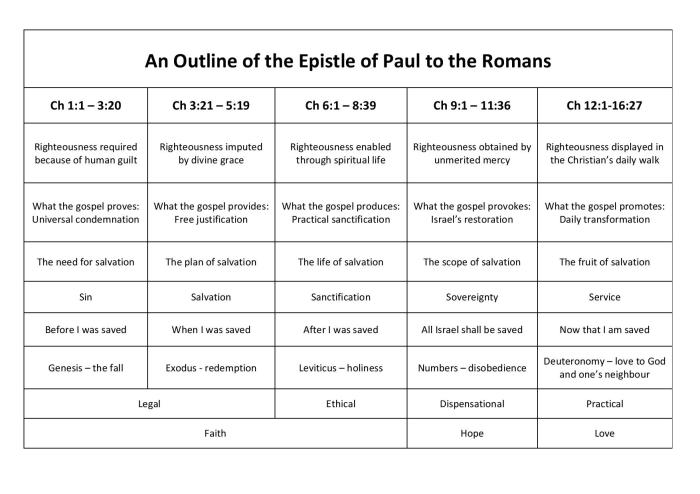Major theological themes in romans – The Epistle to the Romans, a profound and influential letter penned by the apostle Paul, unveils a tapestry of major theological themes that have shaped Christian doctrine for centuries. From the transformative power of justification by faith to the intricate nature of sin, the role of the Holy Spirit, the unity of the church, and the hope-filled promise of eschatology, Romans offers a comprehensive exploration of the fundamental truths that define the Christian faith.
As we delve into these themes, we will discover their profound implications for our understanding of salvation, our relationship with God, and our responsibilities as members of the body of Christ. Through an in-depth examination of Romans, we will gain a deeper appreciation for the richness and complexity of Christian theology, equipping us to navigate the complexities of modern life with faith, hope, and love.
Justification by Faith: Major Theological Themes In Romans
In Romans, justification by faith is the central doctrine that describes how individuals are declared righteous before God. According to this doctrine, individuals are not justified by their own good works or religious observances, but rather by their faith in Jesus Christ.
Faith is the means by which individuals receive the benefits of Christ’s sacrificial death and resurrection, which include forgiveness of sins and reconciliation with God.
Justification by faith has profound implications for salvation. It means that salvation is a gift from God that is received through faith, not something that can be earned through human effort. It also implies that all people, regardless of their background or deeds, have the opportunity to be saved through faith in Christ.
Examples of Justification by Faith
- The apostle Paul, who was a persecutor of Christians before his conversion, was justified by faith after he encountered the risen Christ on the road to Damascus.
- The centurion Cornelius, a devout Gentile, was justified by faith after he heard the gospel preached by Peter.
- The thief on the cross next to Jesus was justified by faith when he confessed his sin and placed his trust in Christ.
The Nature of Sin

Romans presents a comprehensive view of the nature of sin. Sin is described as a universal condition that affects all human beings. It is not simply a matter of breaking laws or committing evil acts, but a fundamental rebellion against God and His authority.
Sin has several consequences for humanity. It separates individuals from God, making them spiritually dead and unable to enter into a right relationship with Him. It also brings about condemnation and judgment, both in this life and in the life to come.
The Role of the Law in Revealing and Condemning Sin
The law plays a crucial role in revealing and condemning sin. The law shows individuals the standards of God’s holiness and righteousness, and it exposes the ways in which they fall short of those standards. The law also serves to increase the guilt and condemnation of individuals by making them aware of their sins.
The Role of the Holy Spirit

The Holy Spirit plays a vital role in the life of a believer. He is the agent through whom God convicts individuals of sin, regenerates their hearts, and empowers them for holiness.
The Holy Spirit convicts individuals of sin by showing them the truth about their own hearts and the standards of God’s holiness. He also regenerates their hearts, giving them a new desire and ability to obey God’s commands. The Holy Spirit empowers believers for holiness by providing them with strength and guidance as they seek to live in accordance with God’s will.
Examples of the Holy Spirit’s Activity in the Lives of Believers, Major theological themes in romans
- The Holy Spirit convicted Peter of his sin after he denied Christ three times.
- The Holy Spirit regenerated the hearts of the disciples on the day of Pentecost, giving them a new desire to follow Christ.
- The Holy Spirit empowered the apostle Paul to endure persecution and to preach the gospel with boldness.
The Church as the Body of Christ

Romans describes the church as the body of Christ, a living organism made up of all believers who are united to Christ as their head. The church is a diverse body, composed of people from all nations, races, and backgrounds, but they are all united by their common faith in Christ.
Within the body of Christ, there is unity and diversity. All believers are united in their faith, their hope, and their love for God. However, there is also diversity in terms of their gifts, their roles, and their ministries. Each member of the body has a unique role to play in the overall functioning of the church.
Role and Responsibilities of Members within the Body of Christ
- All believers are called to be witnesses to Christ and to share the gospel with others.
- All believers are called to love and support one another, regardless of their differences.
- All believers are called to use their gifts and abilities to build up the body of Christ.
Eschatology: Future Events
Romans provides insights into the end times and future events. The biblical teaching on eschatology includes the resurrection of the dead, the judgment, and the eternal state.
The resurrection of the dead will occur at the end of time, when all people who have ever lived will be raised from the dead. The righteous will be raised to eternal life, while the wicked will be raised to eternal condemnation.
The judgment will take place after the resurrection of the dead. All people will be judged according to their deeds and the righteousness of Christ. The righteous will enter into eternal life, while the wicked will be condemned to eternal punishment.
Impact of Eschatology on the Lives of Believers
The doctrine of eschatology should impact the lives of believers in several ways. It should motivate them to live holy lives, to share the gospel with others, and to prepare for the return of Christ.
Key Questions Answered
What is the significance of justification by faith in Romans?
Justification by faith is a central theme in Romans, emphasizing that salvation is not earned through good works or adherence to the law, but rather through faith in Jesus Christ. It liberates us from the condemnation of sin and grants us a right standing before God.
How does Romans describe the nature of sin?
Romans portrays sin as a pervasive and destructive force that has corrupted all of humanity. It is not merely a matter of individual actions but a condition that affects our entire being, leading to separation from God and eternal consequences.
What is the role of the Holy Spirit in the life of a believer?
The Holy Spirit is the divine presence that indwells believers, convicting them of sin, regenerating their hearts, and empowering them for a life of holiness. The Spirit guides, comforts, and intercedes for us, enabling us to live in accordance with God’s will.